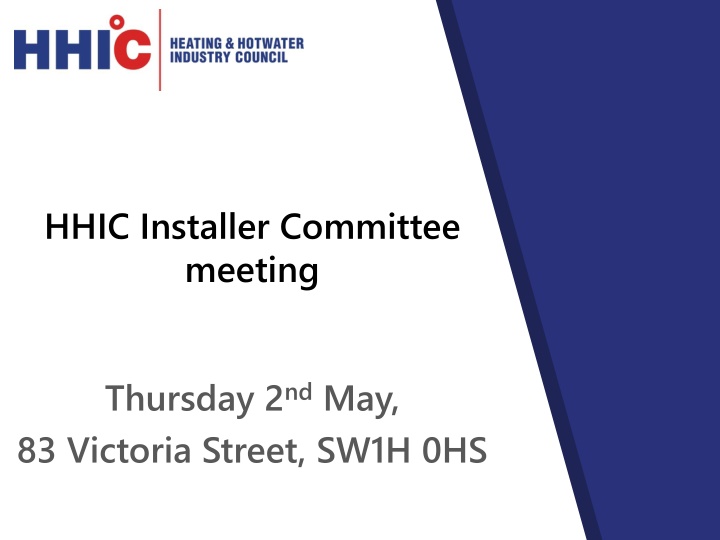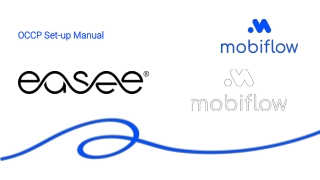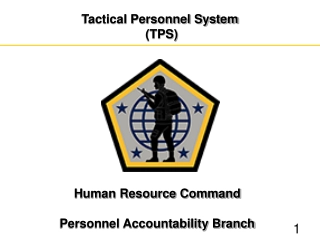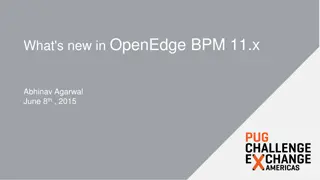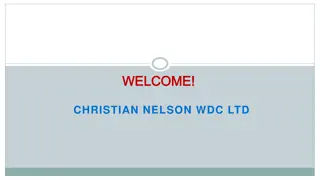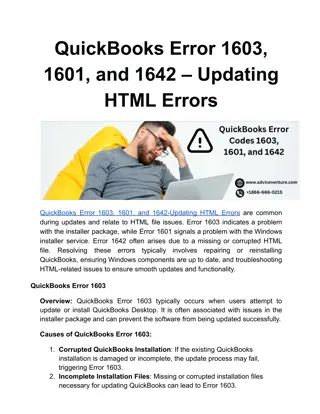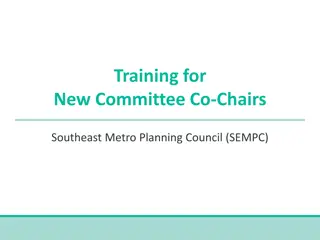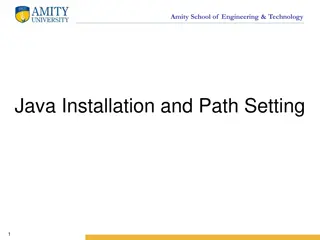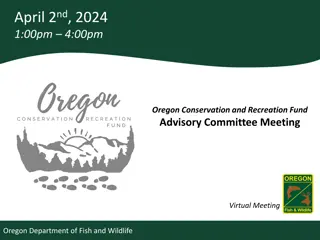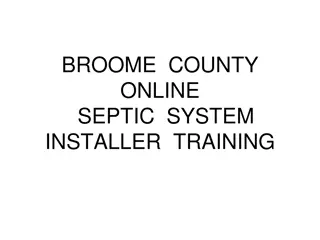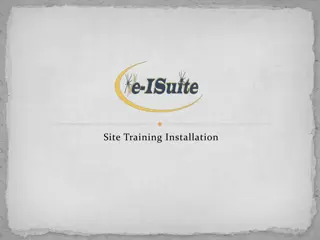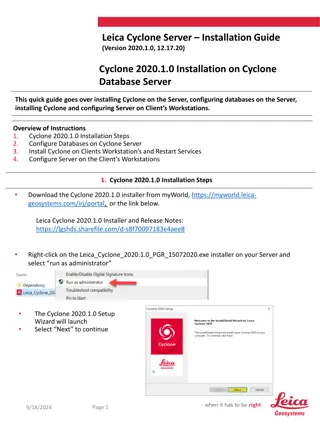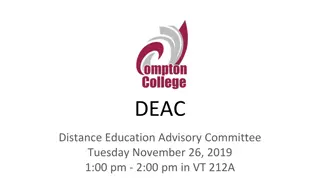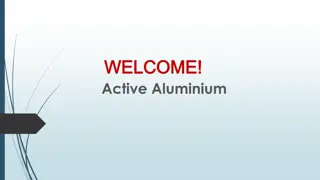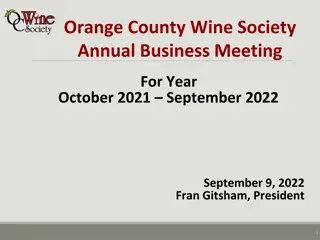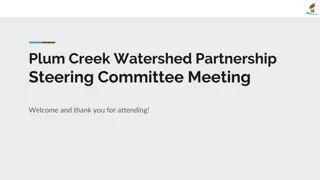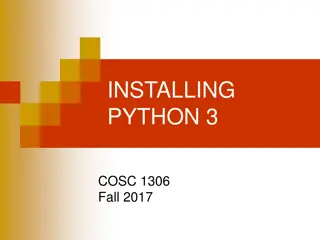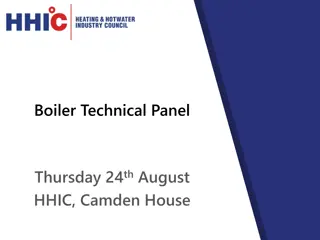HHIC Installer Committee Meeting Highlights
Within the HHIC Installer Committee meeting, various important matters were discussed including the Competition Act compliance, insights on Boiler Plus awareness, workforce diversity, and benchmark gas boiler form revisions. Members engaged in productive dialogue to address industry challenges and enhance standards.
Download Presentation

Please find below an Image/Link to download the presentation.
The content on the website is provided AS IS for your information and personal use only. It may not be sold, licensed, or shared on other websites without obtaining consent from the author.If you encounter any issues during the download, it is possible that the publisher has removed the file from their server.
You are allowed to download the files provided on this website for personal or commercial use, subject to the condition that they are used lawfully. All files are the property of their respective owners.
The content on the website is provided AS IS for your information and personal use only. It may not be sold, licensed, or shared on other websites without obtaining consent from the author.
E N D
Presentation Transcript
HHIC Installer Committee meeting Thursday 2ndMay, 83 Victoria Street, SW1H 0HS
1. Welcome and Apologies Apologies received from: Billy Wilgar A.C. Wilgar Isaac Occhipinti EUA
2. The Competition Act Members are reminded of the requirements of The Competition Act: As a reputable trade association, HHIC s meetings must comply with the requirements of The Competition Act. This means that we must avoid any discussion that could be construed as being anti-competitive and in particular there must be no discussion about pricing of products and services. By attending this meeting and having your names included in the minutes, all participants confirm that they agree to comply with this policy.
Matters arising (17thJanuary) 1) Boiler Plus - DS advised his business had undertaken some consumer research, which could be shared in due course, indicating around 50% of consumers, who had purchased a new boiler installation in recent times, were unaware of Boiler Plus. ACTION: DS Remains open covered by agenda? (Boiler +) 2) ICF study of boiler market (BEIS commissioned) - The group briefly reviewed the notes of a call HHIC had recently held with ICF (the consultancy commissioned by BEIS for this task), detailing some initial answers to their questions posed, and which were based on the likes of members opinions expressed throughout the formative stages of the Boiler Plus policy. ACTION: HHIC to circulate Complete 3) Skills gap? - IO extended an open invitation to members to volunteer any thoughts/comments they may have on what may be needed to bridge any perceived skills/competence gaps ACTION: ALL Covered by agenda (BEIS presentation)
Matters arising (17th January) 4) Workforce diversity (gender) - ACTION: open invitation to members to volunteer any thoughts/comments on barriers to women entering the industry, any in-house initiatives which may be working and increasing diversity etc . Remains open, limited feedback received to date, appears to also be a consideration for the BEIS exercise (installer diversity) 5) Benchmark gas boiler form revision - The group reviewed the draft amendments to the Benchmark gas boiler form, and RH pointed out the text stated the service engineer must be trained on the boiler installed . NM advised this is already stated on the current form, and the group felt this would have been an oversight, is not appropriate, and should be raised with the manufacturers. ACTION: HHIC Complete - working draft amended 6) Run hours - ACTION: NM to feed group comments into HHIC discussions Complete current agreement for Benchmark form is not to include run hours
Matters arising (17th January) 7) Appliance packaging (registered installer messaging) - Members present remain adamant that this is a worthwhile project to progress, and that a consistent message and implementation should be pursued. NM suggested that a smaller, more focused meeting or teleconference between group representatives (e.g. the Chairs) may be a good next step, to allow further direct discussion, and advised that he would seek to arrange this. ACTION: HHIC Complete covered further by agenda
3. BEIS Installer engagement exercise We are delighted to welcome Sophia Danes-Garbaoui and Aaron Gould, from the Department of Business, Energy & Industrial Strategy (BEIS)
4. Boiler Plus; fromconsultation to regulation
Definitions A control function which maintains internal temperatures by varying the flow temperature from the heat generator relative to the measured outside air temperature. Weather Compensation A control function which maintains internal temperatures by varying the flow temperature from the heat generator relative to the measured response of the heating system. Load Compensation Flue Gas Heat Recovery A device which pre-heats the domestic hot water supply by recovering heat from the boiler s flue emissions. Smart Thermostat (automation & optimisation) Automation is a function which automatically adjusts time and temperature settings, based on occupancy detection and/or stored data from user adjustments over time. Optimisation is a control function which starts the boiler operation at the optimum time to achieve the setpoint temperature at the start of the occupancy period.
5. Policy overview Chancellor Phillip Hammond s Spring statement 13th March: thirdly, we will publish proposals to require an increased proportion of green gas in the grid, advancing the decarbonisation of our mains gas supply; and, finally, we will introduce a future homes standard, mandating the end of fossil-fuel heating systems in all new houses from 2025, delivering lower carbon and lower fuel bills, too .
5. Policy overview CCC report Recommendation to Govt. that no new connections to the gas grid should be made from 2025 SAP 10 55% reduction on assumed carbon intensity of electricity, based on SAP 2012 values HHIC have put possible unintended consequences on the radar of BEIS, such as potential compliance solutions through direct electric heating, which could push more consumers into, or towards, fuel poverty (note London Plan has introduced a development hierarchy to help guard against this) Proposal to adopt monthly SAP values for heating, to create a level playing field between technologies BEIS transforming heating document HHIC have responded to the document, which closed for comment on 22nd Feb Points raised by HHIC include the need to put consumer needs/acceptance centre-stage, the validity of Hydrogen as a future energy pathway (the majority of existing home standards are not conducive to effective heat-pump installations), and a role for hybrids
5. Policy overview Off-grid and biofuels BEIS (Katy Read) update/comment at recent FIA meeting December saw the Govt. response to consultation feedback (future frameworks for heat in buildings), electricity offers the best opportunity for off-grid, but other tech can play a role, such as biofuels. Further work on this is needed, looking at costs, impact on supply chain, how to identify fuel in use (compliance?). BEIS also considering electric heating options (storage heaters with smart controls to accommodate DSR etc.). Heat-pumps may not be suitable for all homes. Consideration given to futureproofing of new homes, e.g. larger emitters and low temperature design, some parties are saying that if going to that extent then you should move to low-carbon heat at the same time. BEIS have commissioned a further study into biofuels, which some HHIC members have had input towards. As well as the aforementioned costs, blending possibilities and futureproofing of appliances has been considered, e.g. a part-blend of bio-kerosene and conventional oil, whilst the biofuel industry grows long-term (e.g. to support decarbonisation of transport, aviation etc.)
5. Policy overview Part L and F review (inc. overheating of new homes). Pre-work for Part L review is gathering pace, MHCLG currently setting up working groups (WG), to include domestic , non-domestic , air-tightness , overheating . Evaluating tenders currently (to supply energy modelling to inform approach taken, technical and analytical). 2020 implementation anticipated. CO alarms review has been held with the input of industry WG s, the advice is now with ministers. If decided to extend English requirements beyond solid fuel then this could be implemented via Part J Hackitt Inquiry In December 2018 Govt. published their implementation plan response to the Hackitt Inquiry recommendations. A Spring 2019 consultation is likely, outcomes could be a more robust enforcement regime for high rise, exploring the Joint-Competent-Authority (JCA) recommendation, which could sit above Local Authority Building Control. Some unknowns, it could focus on just fire and structural safety, or all parts of Building Regs. The Govt s response to Hackitt Building a safer future an implementation plan , published in December 2018, can be viewed via the link below https://assets.publishing.service.gov.uk/government/uploads/system/uploads/at tachment_data/file/781707/BSP_-_implementation_programme.pdf
5. Policy overview Approved Documents (Building Regulation) - consideration to be given to whether a specific overarching process only guidance document to Building Regulation should be produced, or as exists currently, process remain combined with the technical requirements in the individual Approved Documents (AD s). Short-term action to create a searchable PDF of all AD s. Short term part J changes likely to remain on hold, as it is felt the key functional requirements remain sound. The AD reviews are broken down by domestic and non-domestic, whereas Part J is broken down by fuel type. Long term J could be revised focusing on the functional requirements, and then breaking down each section by fuel specifics Text that is simply useful advice could disappear from the AD s if not intrinsic to meeting the functional technical requirements, MHCLG feel some statutory guidance is needed, but some parts of industry do not, and there is a balance to be struck
5. Indicative Part L review timeline 4.2.1 Approved Documents L (Conservation of fuel and power), F (ventilation) and overheating The time table is as follows: Consultation starts in July 2019 Completion aimed for February 2020 Published in March 2020 Legal enforcement from October 2020. HHIC are confirmed as participants in the TWG for both England and Wales, respectively The Welsh Govt. has already held one meeting, with the next in July The kick-off meeting for England ( domestic WG) is on May 13th
Economic and Industry Update
Economic update UK GDP Growth at 1.4% as of 2018 YoY. UK Construction Output fell by 0.6% in the 3 months leading to January 2019 UK Service Sector PMI rose to 51.3 as of Feb 2019 from 50. the previous month. UK Manufacturing Sector PMI fell to 52 in Feb 2019 from 52.6 the previous month . Consumer Confidence rose to -13 in Feb 2019 from - 14 in Jan 2019.
Domestic Gas Boilers March 2019 157k boilers sold 8.3% 8.3% on March 2018. YTD 508k boilers - 11% 11% on 2018. MAT 1.69 million boilers - 6.7% 6.7% on 2018. Month YTD MAT % Var %Var %Var Mar-19 Mar-18 Mar-19 Mar-18 Mar-19 Mar-18 Combi 125211 115205 8.7% 396110 362931 9.1% 1322185 1242022 6.5% System 12830 12461 3.0% 43296 39103 10.7% 151200 135685 11.4% Regular 19522 17776 9.8% 68594 55721 23.1% 224787 213688 5.2% Total 157563 145442 8.3% 508000 457755 11.0% 1698172 1591395 6.7%
Energy Company Obligation September 2018 2,865 boilers - 9.22% Qualifying gas boiler replacement 1081 Qualifying non gas boiler replacement 1628 YTD 30.7k boilers 8.54% on 2017 9.22% on 2017
Hot Water Storage Cylinders March 2019 44k cylinders sold 1.8% 1.8% on March 2018 YTD 121k cylinders 0.7% 0.7% on 2018. MAT 464k 3.8% on 2018. Month Month YTD YTD MAT MAT % Var % Var %Var %Var %Var %Var Aug-17 Mar-19 Aug-16 Mar-18 Aug-17 Mar-19 Aug-16 Mar-18 Aug-17 Mar-19 Aug-16 Mar-18 Conventional Conventional 39,007 42,492 37,851 41,113 3.1% 3.4% 308,749 117,570 315,039 114,527 -2.0% 2.7% 463,622 444,837 478,014 459,471 -3.0% -3.2% Renewable Renewable 1,863 1,572 1,715 2,172 8.6% -27.6% 14,703 4,381 14,620 6,630 0.6% -33.9% 21,726 19,404 23,446 22,895 -7.3% -15.2% Total Total 40,870 44,064 39,566 43,285 3.3% 1.8% 323,452 121,951 329,659 121,157 -1.9% 0.7% 485,348 464,241 501,460 482,366 -3.2% -3.8%
Radiators March 2019 519k Radiators sold 6.74% on March 2018. YTD 1.57 million Radiator sold - 3.41% on 2018. MAT 6.3 million Radiators 2 2% % on 2018. Month YTD MAT % Var %Var %Var Mar-19 Mar-18 Mar-19 Mar-18 Mar-19 Mar-18 Radiators 2.05% 519,869 557,420 -6.74% 1,572,784 1,628,378 -3.41% 6,332,956 6,205,994
7. Registered installer messaging appliance packaging
7. Registered installer messaging appliance packaging; actions: Establish Gas Safe Register and ROI equivalent thinking on a common message, to cater for UK and ROI markets, which could include one or both logo s - are there any concerns or restrictions? - Stewart had an informal meeting with Gas Safe Register (about other things) and they are supportive. Gas Safe Register remind that this is the HSE s brand, so we do need to engage with them directly, and we will progress this ASAP. RGI (ROI equivalent) confirm they are happy with the proposal as seen (see attached). Should this not be workable, consider a more generic text, which might cater for multiple markets as per point 1, this looks increasingly workable . Further action here depends on the HSE s response, i.e. we hope that they are receptive to the original proposal, but if they have concerns for any reason we could look at making it more generic, e.g. losing the Gas Safe registered text HHIC to write to boiler manufacturing members to establish if they could, and would, entertain this, e.g. would costs/logistics be manageable? We wrote to the BMG and 11TP group s, setting a deadline for comment. Alongside what we had received last year (initial consultation on idea), there don t appear to be any showstoppers . Manufacturers appear either in favour, or say there are some logistical challenges which are not insurmountable, dependent on timelines etc.
7. Registered installer messaging appliance packaging Revisit further investigation of selling gas appliances only to registered engineers (perhaps to inform next round of group agenda s), e.g. what are the legalities, restrictions and options? This is an ongoing action.We have revisited previous research and are progressing further investigation of relevant issues. It is a complex legal landscape so we would suggest that, if the will is there, we continue with this in parallel with the packaging initiative, as a long-term project, as opposed to an alternative. Martyn to investigate German market practice do they only sell to registered engineers? see below (complete): Update from Martyn Bridges (11TP Chair) I ve spoken with my colleague who knows the majority of European countries and he states that there are no countries that prevent the sale or require the purchaser to be that countries equivalent of Gas-Safe registered in order to buy a boiler. The nearest thing to it is in Germany where the chimney sweep meister is the one who commissions the boiler and will only do so if the installation meets the required standards.
8. PAS 2035 / Trustmark HHIC met with BSI and the technical author of PAS 2035, Peter Rickaby, on 2nd April to raise our concerns. This followed circulation to select HHIC/EUA staff of the latest draft of PAS 2035, subject to NDA s being signed, and which has moved on from the draft for public consultation. There seems to now be some acceptance that the heating industry has been overlooked throughout the drafting process, i.e. no real representation of domestic heat (e.g. boilers) on the steering group. BSI have agreed to involve HHIC in future steering group meetings, as members, but stress publication deadlines will be adhered to. There may be no formal reconvening of the group until 19 months post publication (see Trustmark timeline slide). Technical/editorial comments from HHIC were invited on the draft, and these were submitted by the agreed timelines. We await an update and/or publication of the draft
8. PAS 2035 / Trustmark It is important to emphasise that a consultation of linking PAS 2035 to ECO work is planned, and that despite the ECO boiler cap, we know BEIS are considering extending PAS 2035 to other areas, as best practice , so this could impact much more widely in time, e.g. housing association contracts etc. HHIC s view is that proportionality is key, and wonder if the additional measures suggested will directly address/solve the root cause of any perceived shortcomings? Are these actually more attributable to failings of PAS 2030?
8. PAS 2035 / Trustmark https://www.trustmark.org.uk/aboutus/what'-new-with-trustmark ..It has been decided that TrustMark will be the brand this quality mark is known as, and will expand its remit to include the Retro Fit, Repair, Maintenance and Improvement (RMI), and energy efficiency sectors; covering any work a consumer chooses to have carried out in their home
Trustmark presentation to HHIC 23/04/2019
9. Integrated circulators Amendments to Regulation (EC) 641/2009: the exemption for integrated circulators provided as a spare part for existing boilers is extended by two more years to ensure that installed boilers with a defective circulator can be repaired within their technical lifetime (article 11 and recital 32); it means that integrated circulators, placed on the market as replacement for identical circulators integrated in products and placed on the market no later than 1 August 2015, will need to comply with the minimum Ecodesign requirements from 1 January 2022; Next steps By end May 2019: the Council and the European Parliament have the right to object to the whole text (i.e. no amendment possible); Summer 2019: final adoption of the text by the European Commission and publication in EU OJ; 1 July 2021: application date of the revised Regulation, except for article 7 on circumvention and software updates and article 11 on integrated circulators that will apply from its entry into force.
9. Integrated circulators EHI update; 29th March: On 26 March 2019, the Council published a document informing that Member States have not submitted any comment to the final draft Ecodesign Regulation for electric motors and variable speed drives, as well as integrated circulators. It means that the 'Coreper', composed of each country's deputy permanent representatives, will recommend the Council not oppose to the draft measure. Next steps 3 April 2019: the Coreper will recommend the Council to confirm that there are no grounds for opposing the draft Ecodesign Regulation; By end May 2019: the Council to confirm that there is no ground to oppose the draft measure; the European Parliament has the right to object to the draft measure.
10. Ban on use of combustible materials in external walls of high rise dwellings Impact upon boiler installations in England: December 2018 changes to the Building Regulations (England) came into effect on 21st December, and have implemented new criteria for all materials forming part of the external wall in high rise residential dwellings (>18m), bar specific, listed exemptions. The ban limits materials to products achieving a European Classification of Class A1 or A2-s1,d0 when tested in accordance with BS EN 13501-1 :2007+A1:2009 Alongside new dwellings constructed, MHCLG have confirmed that building work being undertaken, e.g. the installation of a notifiable replacement gas boiler in such dwellings, will trigger the requirement to ensure all works undertaken are in compliance with current Building Regulations
10. Ban on use of combustible materials in external walls of high rise dwellings New definition of external wall inserted into Building Regulations now captures building penetrations, e.g. flues, boiler PRV pipes and condensate disposal pipe runs, not merely construction elements: (6) In these Regulations (a)any reference to an external wall of a building includes a reference to (i)anything located within any space forming part of the wall; (ii)any decoration or other finish applied to any external (but not internal) surface forming part of the wall; (iii)any windows and doors in the wall; and (iv)any part of a roof pitched at an angle of more than 70 degrees to the horizontal if that part of the roof adjoins a space within the building to which persons have access, but not access only for the purpose of carrying out repairs or maintenance
10. Ban on use of combustible materials in external walls of high rise dwellings HHIC meeting with MHCLG on 11th April, actions agreed: MHCLG clarified that the effect of the 2018 amendment is that when a gas boiler is replaced and the flue becomes part of the external wall in a relevant building then the flue components that pass through the external wall are caught by the ban on combustible materials. HHIC said that flue products for gas condensing boilers tend to be plastic as the condensate was slightly acidic/corrosive and such products were not readily available they considered an all metallic solution non- combustible solution could be engineered but this would need to be certified under the construction products regulations and so would take some time to bring to market. HHIC to pursue this with manufacturers and advise on timescales. As well as any CPR-certification required for the standalone flue product, a change in flue material/construction may effect a material change to the combined boiler/flue certification under The Gas Appliances Regulation , and so may similarly require additional testing and recertification, hence feeding into the time to bring to market . being actively explored with boiler manufacturers MHCLG to explore with legal and ministers the possibility of a period of grace/relaxation. - ongoing MHCLG and HHIC to share data on the number of dwellings in relevant buildings and number of boiler sales to extrapolate the number of gas boiler/flue replacements affected and determine the market size/demand - We have calculated that there are probably around 300,000 boilers in situ in high rises. This is based on using the English Housing Survey numbers of number of High Rises and then the number that have no gas connection and then being a bit more conservative. From this we estimate that there are around 20k replacements per annum. MHCLG to investigate with legal the correct interpretation (i.e. permissibility) of boiler plume management kits, if to be mounted to the external walls of these dwelling types - ongoing
11. Hydrogen activity Hy4Heat (inc. PAS 4444) BSI are developing this PAS to support hydrogen appliance (WP4) certification under WP3. The initial scoping workshop has already been held, and Bob Walsh (ICOM consultant) appointed as technical author
11. Hydrogen activity HyDeploy H2 injection into the Keele network is due to start in August 2019 Will help inform HyDeploy 2, which is looking to build to a position where it can be demonstrated that pre-checks and monitoring are not required for a given H2NG blend H2 ready efficiency bonus proposal (ErP) Lot 1 review study; task 6; options: Given that there are only 31 years till 2050, it is recommended that H2-ready will become a mandatory Ecodesign requirement as soon as possible. As is customary in these situations to give time for the market actors to prepare, it is proposed to first introduce the H2-ready concept in the Energy Labelling, i.e. giving a 20% energy efficiency bonus leading to an A+ rating for a single boiler, and then after 2 years make H2-ready mandatory.
11. Hydrogen activity CEN-CENELEC TC6 ( Hydrogen in energy systems ) HHIC have joined WG1, which has an early task of developing a Hydrogen vocabulary document, with our initial interest being in defining residential appliances , alongside cross-cutting issues/terms
12. Standards update BS 7593 draft is finalised with publication expected any time BS 6798 5 year review has begun, with initial thoughts/comments from panel members collated. Parent GSE/30 committee has concluded that a house- keeping amendment is required. BS 6891 The current amendment is due for publication imminently. BSI is in the process of typesetting/production for publication of the amendment in April. Endorsement to publish will shortly be sought. BS 5440-1 (flueing) & 5440-2 (ventilation) Chairman to review and send ad- hoc drafts to panellists for 4 week commenting period
13. Benchmark The Delta EE review concluded in March, with the production of a final report, and on which a high level overview was provided by Delta EE Director Jon Slowe at the HHIC annual members lunch Digitalisation , and the increased potential of a truly online Benchmark remain key feedback themes from stakeholders, and HHIC are now considering options, and how best to progress this Benchmark gas boiler form revision: Some minor editorial points still to resolve Additions/changes since last update to group (working draft): Reference to BS 7593 on service record (inhibitor testing in line with BS 7593) Flue integrity check to be included in commissioning section Run hours not expected to be included as it is not currently standard industry practice and many boilers do not lend themselves to it at this moment in time
